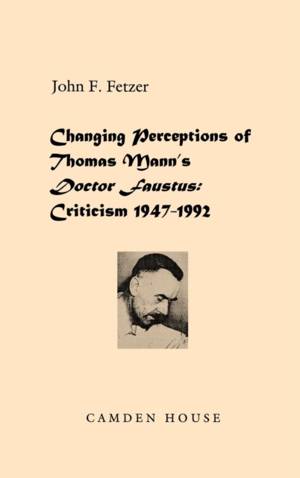
- Afhalen na 1 uur in een winkel met voorraad
- Gratis thuislevering in België vanaf € 30
- Ruim aanbod met 7 miljoen producten
- Afhalen na 1 uur in een winkel met voorraad
- Gratis thuislevering in België vanaf € 30
- Ruim aanbod met 7 miljoen producten
Zoeken
€ 177,45
+ 354 punten
Omschrijving
Wide-ranging survey of the critical reaction provoked by Mann's Doctor Faustus. Since its publication in 1947, Thomas Mann's daring treatment of the Faust theme has generated diverse reactions from the critics, and continues to provoke controversies. This volume traces the history of its critical reception. Topics considered include the political stance of the author and the historical dimensions of the novel; the autobiographical background of the novel - especially in the light of the subsequent publication of Mann's diaries and private notebooks; the issue of intertextuality; the way in which the novel exhibits structural features of the music on which the narrative focuses; and the function of mythic prototypes. Of particular importance is the question ofthe precise role played by Goethe's Faust in the conception and execution of Doctor Faustus, in spite of Mann's assertion that the works had `nothing in common'. Finally, the presence of strong visual elements in thenovel leads to an assessment of the critical reception accorded to Franz Seitz's film adaptation of Doctor Faustus (1982). JOHN F. FETZER is Professor of German Emeritus at the University of California, Davis.
Specificaties
Betrokkenen
- Auteur(s):
- Uitgeverij:
Inhoud
- Aantal bladzijden:
- 214
- Taal:
- Engels
- Reeks:
- Reeksnummer:
- nr. 37
Eigenschappen
- Productcode (EAN):
- 9781571130709
- Verschijningsdatum:
- 4/04/1996
- Uitvoering:
- Hardcover
- Formaat:
- Genaaid
- Afmetingen:
- 169 mm x 235 mm
- Gewicht:
- 462 g

Alleen bij Standaard Boekhandel
+ 354 punten op je klantenkaart van Standaard Boekhandel
Beoordelingen
We publiceren alleen reviews die voldoen aan de voorwaarden voor reviews. Bekijk onze voorwaarden voor reviews.











